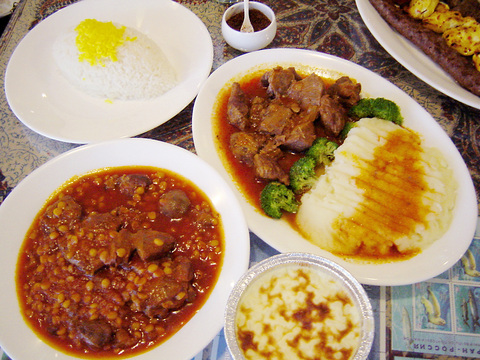Restaurants that offer exotic cuisines from faraway lands are usually among the most sought-after eateries due to their novelty and rarity. While Persian Heaven Restaurant can certainly benefit from its novelty value as the only establishment in the capital that offers authentic Iranian cuisine, the joint also pleases gourmets with good-quality food.
“We have 15 main dishes that are typical of traditional Iranian cuisine. It's like whenever you think of Taiwanese fare, you think of noodles,” said the restaurant's outrageously young manager who goes by the name Ali.
According to the 18-year-old, who is the eldest son of the Iranian proprietor, preparing barbecued delicacies is a time-consuming process. Meat is not ready for the grill until it is softened after being marinated for two days. A unique feature of the barbecue dishes is the Iranian seasoning powder called somagh, which packs a sour and salty punch.

PHOTO: HO YI, TAIPEI TIMES
The must-try on the grilled side is the barbecued chicken, lamb and beef. If you are a fan of saffron, the barbecued chicken breast is tinged yellow by the seasoning.
As for the stewed options, the Iranian haricot with assorted vegetables is cooked for six hours, and the marinated lamb is later added for another four to five hours of simmering at a low heat.
Haricot with eggplant is another highlight on the menu as Ali points out that lamb and eggplant are two favorite viands of Iranians.
It is interesting to note that the restaurant uses only meat that is halal, which is imported from Australia and New Zealand.
Given that Muslims avoid alcohol, the joint doesn't have a liquor menu but features the Iranian yogurt drink called Dogh, which is mildly salty flavor and tastes of peppermint. Dogh is an acquired taste; many clienteles say it tastes like liquid toothpaste. A more popular beverage among the locals is the ice tea with a pleasant strong cinnamon flavor.
The jolly, voluble manager is a devoted host passing from table to table, attending clienteles in this homely joint that can easily accommodate 80 people. Patrons can also relax at the outdoor seats and smoke scented tobacco through an Iranian water pipe.

May 26 to June 1 When the Qing Dynasty first took control over many parts of Taiwan in 1684, it roughly continued the Kingdom of Tungning’s administrative borders (see below), setting up one prefecture and three counties. The actual area of control covered today’s Chiayi, Tainan and Kaohsiung. The administrative center was in Taiwan Prefecture, in today’s Tainan. But as Han settlement expanded and due to rebellions and other international incidents, the administrative units became more complex. By the time Taiwan became a province of the Qing in 1887, there were three prefectures, eleven counties, three subprefectures and one directly-administered prefecture, with

Taiwan Power Co (Taipower, 台電) and the New Taipei City Government in May last year agreed to allow the activation of a spent fuel storage facility for the Jinshan Nuclear Power Plant in Shihmen District (石門). The deal ended eleven years of legal wrangling. According to the Taipower announcement, the city government engaged in repeated delays, failing to approve water and soil conservation plans. Taipower said at the time that plans for another dry storage facility for the Guosheng Nuclear Power Plant in New Taipei City’s Wanli District (萬里) remained stuck in legal limbo. Later that year an agreement was reached

What does the Taiwan People’s Party (TPP) in the Huang Kuo-chang (黃國昌) era stand for? What sets it apart from their allies, the Chinese Nationalist Party (KMT)? With some shifts in tone and emphasis, the KMT’s stances have not changed significantly since the late 2000s and the era of former president Ma Ying-jeou (馬英九). The Democratic Progressive Party’s (DPP) current platform formed in the mid-2010s under the guidance of Tsai Ing-wen (蔡英文), and current President William Lai (賴清德) campaigned on continuity. Though their ideological stances may be a bit stale, they have the advantage of being broadly understood by the voters.

In a high-rise office building in Taipei’s government district, the primary agency for maintaining links to Thailand’s 108 Yunnan villages — which are home to a population of around 200,000 descendants of the Chinese Nationalist Party (KMT) armies stranded in Thailand following the Chinese Civil War — is the Overseas Community Affairs Council (OCAC). Established in China in 1926, the OCAC was born of a mandate to support Chinese education, culture and economic development in far flung Chinese diaspora communities, which, especially in southeast Asia, had underwritten the military insurgencies against the Qing Dynasty that led to the founding of